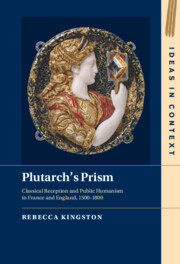Book contents
- Plutarch’s Prism
- Ideas in Context
- Plutarch’s Prism
- Copyright page
- Contents
- Figures
- Preface
- Acknowledgements
- Introduction
- Part I Setting the Stage
- Part II Plutarch in Renaissance France and England
- Part III Seventeenth- and Eighteenth-Century Plutarch
- Chapter 8 Shedding New Light on Thomas Hobbes’s Leviathan (1651)
- Chapter 9 Plutarch on Stage: Shakespeare, Pierre Corneille and Jean Racine
- Chapter 10 Plutarch in the Long Eighteenth Century with a Focus on British and Irish Political Thought
- Chapter 11 Plutarch in French Enlightenment Thought: The Abbé de Saint-Pierre, the Abbé Mably and Jean-Jacques Rousseau
- Conclusion
- Bibliography
- Index
Chapter 9 - Plutarch on Stage: Shakespeare, Pierre Corneille and Jean Racine
from Part III - Seventeenth- and Eighteenth-Century Plutarch
Published online by Cambridge University Press: 22 September 2022
- Plutarch’s Prism
- Ideas in Context
- Plutarch’s Prism
- Copyright page
- Contents
- Figures
- Preface
- Acknowledgements
- Introduction
- Part I Setting the Stage
- Part II Plutarch in Renaissance France and England
- Part III Seventeenth- and Eighteenth-Century Plutarch
- Chapter 8 Shedding New Light on Thomas Hobbes’s Leviathan (1651)
- Chapter 9 Plutarch on Stage: Shakespeare, Pierre Corneille and Jean Racine
- Chapter 10 Plutarch in the Long Eighteenth Century with a Focus on British and Irish Political Thought
- Chapter 11 Plutarch in French Enlightenment Thought: The Abbé de Saint-Pierre, the Abbé Mably and Jean-Jacques Rousseau
- Conclusion
- Bibliography
- Index
Summary
Chapter 9 discusses the use of Plutarch in drama understood as a mode of political reflection. I provide a brief analysis of the political implications of Shakespeare’s (1564–1616) famous use of Plutarch in a series of plays devoted to key figures of the classical era. I explore how Shakespeare’s depiction of public life shifted between his first Roman play Titus Andronicus, deemed to have been written before his close study of North’s translations of Plutarch, and his latter plays focused on key Greek and Roman historical figures (Timon of Athens, Coriolanus, Julius Caesar and Antony and Cleopatra) for which his use of North is heavily documented and discussed. I then explore political themes and argument stemming from Plutarch and as relayed through Pierre Corneille’s (1606–1684) Pompée and Jean Racine’s (1639–1699) Mithridate.
Keywords
- Type
- Chapter
- Information
- Plutarch's PrismClassical Reception and Public Humanism in France and England, 1500–1800, pp. 318 - 350Publisher: Cambridge University PressPrint publication year: 2022



